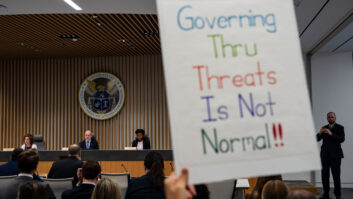An AM station in Louisiana is getting a second chance from the FCC to obtain an FM translator. In the course of this case, the commission also said that its Media Bureau has not acted consistently in certain types of waiver cases.
The saga prompted the commission to consider cases going forward when a grant of a late-filed license to cover of already built station facilities may be warranted.
Initial filing and field inspector visit
1110 KTTP(AM) is a Class D daytime-only gospel station licensed to Pineville. In 2019, its owner, the Alexandria-based Radio Two, applied for an FM translator to broadcast on 107.5 FM. The commission granted the station a construction permit. CP grants come with a three-year period to build the station.
KTTP never filed for a license for the translator and its CP expired in June 2022. In May 2023, an FCC field inspector determined that Radio Two had been operating the translator despite the expired CP.

Its primary AM signal was also off the air, meaning the expired translator was airing original programming.
After the inspector’s visit, Radio Two filed a petition for reconsideration with the commission, asking for the permit to be reinstated and its license granted. KTTP said it had not realized the CP had expired and that it had completed construction of the translator prior to expiration. It argued that reinstatement would serve the public interest.
The FCC issued a reconsideration letter in September that dismissed Radio Two’s petition as procedurally defective. KTTP had not directly requested a waiver of the commission’s timely-filed license requirement but the Media Bureau considered it on its own. It declined the waiver because Radio Two had not shown any “rare and exceptional circumstances beyond the permittee’s control.”
Radio Two subsequently filed an application for review that October. It argued that the Media Bureau’s Audio Division erred by limiting its analysis to such rare and exceptional circumstances. The broadcaster noted that the bureau, in rulings concerning mostly TV stations, had sometimes granted waivers for late-filed license applications.
KTTP again asserted that it had completed construction of the translator prior to the CP’s expiration.
Bureau “has not acted consistently”
The application for review prompted a reevaluation by the commission. While it found that the Media Bureau had properly dismissed Radio Two’s petition as late-filed, it also said that the Bureau erred by requiring KTTP to demonstrate rare and exceptional circumstances to justify a waiver.
(Read the commission’s memo opinion and order on the KTTP translator case.)
“Radio Two argues that the Bureau has not acted consistently in waiver cases involving late-filed covering license applications,” the commission wrote. “We agree.”
The commission concluded that further bureau-level proceedings are necessary, as it was incorrect to require KTTP to demonstrate rare and exceptional circumstances.
Handling of late-filed license applications
The commission explained that historically it has required applicants to show “good cause” to obtain a waiver if construction was completed before the end of the three-year CP period. But that standard, it clarified, had never been applied to permittees who completed construction on time but filed the license application after the CP expired.
Even if a license application is late-filed, the commission said there may be good cause to waive the timely-filing requirement — particularly when doing so allows a station that completed construction prior to expiration to serve the public without harming any party that may have relied on the CP’s expiration.
The FCC acknowledged that accepting untimely applications might place an “additional processing burden on commission staff,” but said that in some cases, the public benefit would outweigh the impact.
The commission does not place a specific time limit on late-filed requests, which it said provides flexibility to where good cause might be found to grant a waiver. It added that it is in an applicant’s best interest to file on time or to request a waiver as soon as possible because as the time from permit expiration increases, evidence of timely construction may be harder to obtain and the odds that a waiver may conflict with a third party increase.
Further action considered
As a result, Radio Two now has 30 days to file a license for the expired translator, along with a waiver request detailing its circumstances.
KTTP will need to provide evidence that the facility was constructed before the permit expired, which includes photographs and statements from the company that oversaw construction.
The FCC is still evaluating potential enforcement action for Radio Two’s failure to file a timely license application, as well as its unauthorized operation from approximately January 2021 to May 2023.
The Media Bureau will protect the 107.5 translator’s facilities from conflict with any future-filed application during the 30-day period.
The commission has also opened a corresponding window for filing objections to the license application and waiver request.
The translator’s originally granted CP facility location is approximately three miles north of Pineville and Alexandria, listed with 250 watts ERP.







